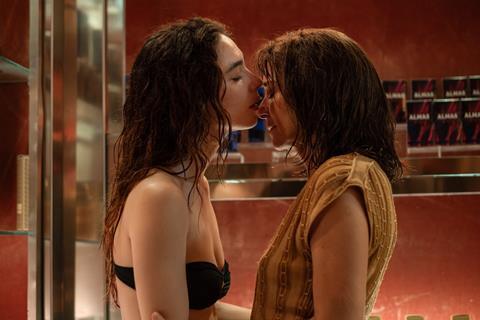Mario Martone’s Competition entry focuses on the author’s brief imprisonment and subsequent self-discovery

Dir: Mario Martone. Italy/France. 2025. 115mins
Fuori is a sometimes engaging, sometimes self-indulgent story of an Italian female writer’s unorthodox journey towards personal and creative freedom in early 1980s Rome. The film is based around the brief jailtime served by Italian author Goliarda Sapienza (played here by Valeira Golino) for jewel theft. She would later recount this transformative experience in books that were among the few to be published in her lifetime; she found true recognition only after her death in 1996.
Temporal leaps don’t distract from the fact that the plot is threadbare in places
Opening captions sketch in a little of that backstory, but it’s not necessary to know much about Sapienza or to have read her defining work – the posthumously-published 500-page feminist historical novel ’The Art of Joy’ – to appreciate what is essentially the story of one woman’s jailbreak. It’s a jailbreak with a twist, in that the escape is not from prison but thanks to it. There’s a small issue here, however, that Fuori (which translates to ‘outside’) never acnkowledges: the writer’s sojourn in Rome’s Rebibbia prison lasted all of five days – and she got two books out of it. The film massages Sapienza’s jail time to make it seem longer – no crime in itself but, even despite the understated authenticity that Golino brings to the character of Sapienza, there’s no getting away from the feeling that we’re watching a feature-length exercise in slum tourism.
On Italian home ground – where the film will be released by 01 Distribution on 22 May, straight after its Cannes competition bow – Goliarda Sapienza’s growing reputation, coupled with the 2025 Sky Atlantic six-part miniseries adaptation of The Art of Joy that Golino directed and co-wrote, should drive interest. Elsewhere, its reception will likely be more subdued – though one of the film’s winning minor qualities, its nostalgia for an older, analogue Rome of tourist-free cafés, open-top coupés and dial phones, could strike a chord with older audiences.
Despite her brief period of incarceration, Sapienza forges close bonds with her fellow inmates who she continues to meet over the summer following her release. The before, during and after of Sapienza’s prison sojourn get mixed up in the film’s tricksy timecode, leaving us to put the pieces in chronological order. Spaces themselves are unreliable and surprising. Anonymous residential streets and patches of wasteground are separated only by a hole in a graffitied wall. A bookshelf in the writer’s comfy, cultured Rome apartment swings back to reveal a kitchen where a man is cooking (the idea that this occasional caller is actually Sapienza’s husband hardly occurs to us.).
Similarly, a display case in a perfume shop set up by one of the author’s former cellmates, the emotionally fragile Barbara (played by pop singer Elodie), falls open to reveal a bare, pink-tiled bathroom. This, however, becomes the site of a major tonal wobble, a naked three-in-a-shower scene (lifted straight from Sapienza’s book) that presumably wants to be a kind of purification ritual but feels uncomfortably voyeuristic.
The camerawork of Paolo Carnera (Io Capitano) and the production design of longtime Paolo Sorrentino collaborator Carmine Guarino are willing accomplices in this dislocation of a simple tale. This is at heart a summer film – but an edgy one. Rome’s walls, piazzas and humans are lit by frank, unforgiving sunlight, and Rebibbia’s exercise yard looks, from certain angles, like an all-concrete Italian 1950s beach lido. The prison’s interior is a performative space, a theatre in which every sightline is complicated by bars and grilles. Even makeup and hair lend a hand – Goliarda and Roberta (Matilda De Angelis), the rebellious young political prisoner she meets in jail, come to resemble each other to the point where a waiter takes them for mother and daughter. Crowning these disjuncts is a sparse soundtrack consisting almost entirely of five songs by a great British musical outsider, Robert Wyatt. They don’t really match the story, but that’s kind of the point.
Martone has used such discordant jazz-cinema techniques before – perhaps most effectively in his two previous Cannes competition films, Amore Molesto (1995) and Nostalgia (2022). Here, for the first time, they lead not towards destruction but a kind of celebration. In its weaker moments, among them an open-top Mercedes ride that ends with spaghetti on the beach, Fuori feels like a music video. And the temporal leaps don’t distract us from the fact that the plot is threadbare in places – for example, the political activism that has landed Roberta in prison is kept at a discreet distance, perhaps because it would disturb her role as Goliarda’s chief conduit to the joys of salt-of-the-earth instinctiveness.
Such lapses are compensated for by the crackle in the air whenever the two women meet up in Rome once they’re both on the outside. Matilda de Angelis is electric as the confident but vulnerable and self-destructive Roberta, who applies to life in general her tendency to hot-wire a car when she needs a ride.
Production companies: Indigo Film, Rai Cinema, The Apartment
International sales: Goodfellas, feripret@goodfellas.film
Producers: Nicola Giuliano, Francesca Cima, Carlotta Calori, Viola Prestieri, Annamaria Morelli
Screenplay: Ippolita di Maio, from books by Goliarda Sapienza
Cinematography: Paolo Carnera
Production design: Carmine Guarino
Editing: Jacopo Quadri
Music: Valerio Vigliar
Main cast: Valeria Golino, Matilda De Angelis, Elodie, Corrado Fortuna, Antonio Gerardi, Daphne Scoccia, Sonia Zhou, Paola Pace
























